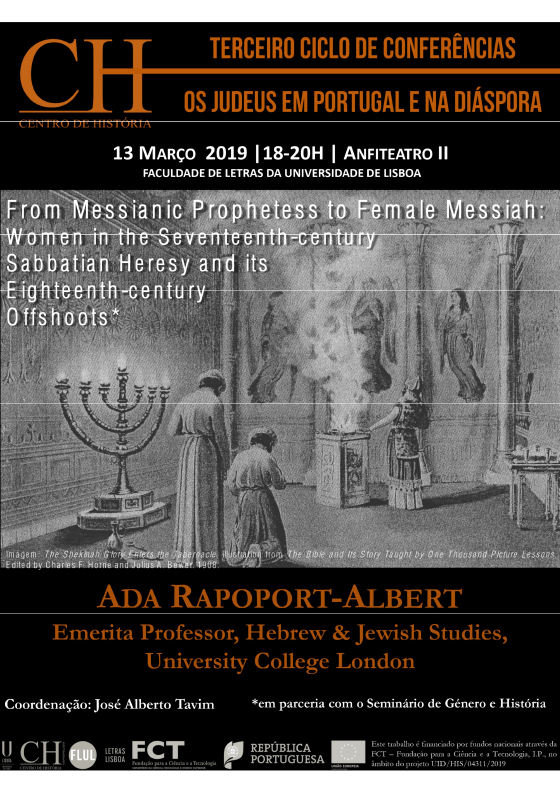Terceiro Ciclo de Conferências – Seminário Os Judeus em Portugal e na Diáspora | Seminários CH-ULisboa | From Messianic Prophetess to Female Messiah: Women in the Seventeenth-century Sabbatian Heresy and its Eighteenth-century Offshoots
Faculdade de Letras da Universidade de Lisboa, 13 de Março de 2019, Anfiteatro II, às 18:00
Organização | Org. Centro de História da Universidade de Lisboa

Rabbinic Judaism has traditionally displayed a highly ambivalent attitude towards the phenomenon of prophecy which, it argued, had ceased for good with the demise of the last three biblical prophets. Against this background, the lecture considers the evidence for Jewish prophetic activity, especially by women, in the period leading up to the mid-seventeenth-century eruption of mass prophecy associated with the messianic claims of Sabbatai Tsevi. An Izmir-born kabbalist, operating in an Ottoman-Jewish milieu which had been inundated by immigrant Sephardi and converso culture, he believed himself to be the final redeemer who would bring salvation to the Jews and, ultimately, to the whole of mankind. The messianic movement he inspired was the largest and longest-lasting in the history of the Jewish Diaspora. It spread rapidly throughout the Jewish world despite Tsevi’s sudden conversion to Islam in1666, his consequent denunciation as a false messiah, and his death in exile, in relative isolation, ten years later. The belief in his messianic vocation, and in the claims of others who saw themselves as his successors, persisted throughout the eighteenth century and beyond, when the movement – publicly declared heretical and subjected to rabbinic persecution – continued to operate underground as a network of clandestine sectarian organisations. One of its earliest and most striking features, discernable in every one of its diverse manifestations and transmutations, was the exceptionally high profile of the women within its ranks. The lecture reviews the full range of women’s involvements with the movement, which culminated in the elevation of one of them to the role of Messiah.
Ada Rapoport-Albert is Professor Emerita of Jewish Studies and former Head of Hebrew and Jewish Studies at University College London (UCL). She specializes in the Jewish mystical tradition, especially Hasidism, the messianic movement of Sabbatai Zevi, ascetic practice in rabbinic Judaism, and gender issues relating to all the above. Her publications include Hasidism Reappraised (1996, as editor), Women and the Messianic Heresy of Sabbatai Zevi, 1666-1816 (2011), Studies in Hasidism: Essays in History and Gender (2018), and, in Hebrew, Studies in Hasidism, Sabbatianism, and Gender (2015).

